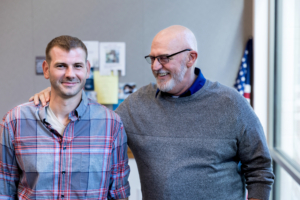Post-traumatic stress disorder (PTSD) can be overwhelming for both the individual and their family. PTSD is a common illness, not a sign of weakness, with the National Center for PTSD reporting about 12 million adults in the U.S. living with PTSD during a given year.
As a loved one to someone battling PTSD, understanding how symptoms can affect many aspects including their career, family, and just day-to-day life is key to supporting them. Oaks Integrated Care offers mental health services with a focus on Trauma Informed Care for individuals and their families. Here are some tips to help guide you through the process of helping someone with PTSD.

Learn and listen.
Educate yourself on the symptoms and treatment options for PTSD to accurately support your loved one. Remember that every individual holds a different experience with PTSD, making learning about what triggers your loved one important to the support process. Keep an eye out for reactions to noises, conversations, or even topics that induce stress.
Respect their space.
PTSD can be an ongoing battle. As a supporter of your loved one, allow them to be upset, and give them the space they need to express their emotions. Try to avoid making assumptions about their feelings, and provide them with the time they need to trust at their own pace.
Provide support, not pressure.
Talking about a traumatic experience can be very difficult for someone with PTSD. Instead of pressuring them to share, comfort them by letting them know you are always willing to talk if they want to and accept if they do not feel ready yet. It is important to be patient and understand that recovery can be a process.
Build trust and safety.
Traumatic events can make the world feel dangerous or even frightening if battling PTSD. Rebuilding a sense of security and comfort for your loved one can emphasize your commitment to them. Start by minimalizing any noticeable stressors, and ensure your trustworthiness through sticking to your commitments to them.
Look after your well-being.
Your mental health holds just as much value as your loved one’s. In order to best support them, remember to care for yourself in the process including physical needs, personal goals, and overall happiness. Setting boundaries and communicating this with your loved one can make all the difference.
Consider support treatment.
Treatment is a great asset to guiding the support process for PTSD. Determine if this is the right route for your loved one by contacting Oaks Integrated Care. We can help navigate the process with you. To learn more or schedule and appointment, call our Access Center at 1-800-963-3377 or fill out our contact form.









